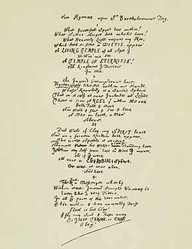Thomas Traherne (1636/7 - 1674)
|
Thomas Traherne was a minor poet of the sevententh century. Brought up in Hereford the son of a shoemaker, he studied at Brasenose College and was ordained into the Church of England in 1660. He became minister at Credenhill where he was described as 'a good and godly man' who 'visited the poor'. Upon his death in 1674 he was described by a canon as 'one of the most pious and ingenious men' he had ever known.
He published one book in his lifetime, Roman Forgeries, and a second, Christian Ethicks, was published a year after his death. The rest of his writings remained in unknown manuscript for between two and three hundred years until discovered in a series of remarkable finds considered one of the most fascinating in English literature. The first manuscripts, containing poems and reflections, were discovered in bargain baskets of two London booksellers in 1896 and published as The Poetical Works of Thomas Traherne and Centuries of Meditations. |
Further manuscripts were discovered including one rescued from a rubbish tip fire in the early 1960's.
Facsimile of the manuscript of Thomas Traherne's poem "An Hymne upon St. Bartholomew's Day", from Bertram Dobell's 1903 edition of his poetical works - a limited edition volume of Traherne's poems printed on hand made paper and bound in vellum.
|
His poetry and prose are remarkable for their passion and joy which Traherne referred to as felicity. All are centered around God as a Loving Presence that longs for us to know the depth of his love.
'The Sun is a glorious Creature, and its Beams extend to the utmost Stars, by shining on them it cloaths them with light, and by its Rayes exciteth all their influences. It enlightens the Eyes of all the Creatures: It shineth on forty Kingdomes at the same time, on Seas and Continents in a general manner; yet so particularly regardeth all, that every Mote in the Air, every Grain of Dust, every Sand, every Spire of Grass is wholly illuminated thereby, as if it did entirely shine upon that alone. Nor does it onely illuminate all these Objects in an idle manner, its Beams are Operative, enter in, fill the Pores of Things with Spirits, and impregnate them with Powers, cause all their Emanations, Odors, Vertues and Operations; Springs, Rivers, Minerals and Vegetables are all perfected by the Sun, all the Motion, Life and sense of Birds, Beasts and Fishes dependth on the same.'
|
